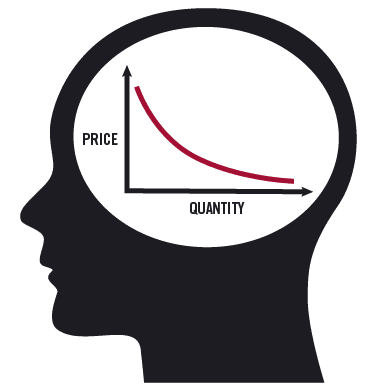7 REASONS WHY YOU SHOULD STUDY ECONOMICS
学习经济学的 7 个理由
WHAT IS ECONOMICS?
什么是经济学?
At its core, economics is the study of how individuals, groups, and nations manage and use resources.
经济学的核心是研究个人、团体和国家如何管理和使用资源。
Economics can be broken down into microeconomics, which examines individual decisions, and macroeconomics, which is concerned with the economy as a whole. Both types of economics utilize historical trends and current conditions to inform business decision-making and make predictions of how markets will behave in the future.
经济学可以分为考察个人决策的微观经济学和关注整体经济的宏观经济学。这两种经济学都利用历史趋势和当前条件来为商业决策提供信息,并预测未来市场的表现。
WHY IS STUDYING ECONOMICS IMPORTANT?
为什么学习经济学很重要?
Students who choose to study economics not only gain the skills needed to understand complex markets but come away with strong analytical and problem-solving skills, as well as the business acumen necessary to succeed in the professional world.
选择学习经济学的学生不仅获得了理解复杂市场所需的技能,而且还具备强大的分析和解决问题的能力,以及在专业领域取得成功所必需的商业头脑。
In fact, economics can be useful for professionals in all industries and aspects of daily life, not just in business.
事实上,经济学对所有行业和日常生活各个方面的专业人士都有用,而不仅仅是在商业领域。
7 REASONS TO STUDY ECONOMICS
学习经济学的 7 个理由
Here’s a look at seven advantages of studying economics and how it can benefit both your organization and career.
以下是学习经济学的七个优势,以及它如何使您的组织和职业受益。
1. You’ll Expand Your Vocabulary
1. 你会扩大你的词汇量
Whether it’s scarcity (limited resources), opportunity cost (what must be given up to obtain something else), or equilibrium (the price at which demand equals supply), an economics course will give you fluency in fundamental terms needed to understand how markets work. Even if you don’t use these words often in your current role, studying these economic terms will give you a better understanding of market dynamics as a whole and how they apply to your organization.
无论是稀缺性(有限的资源)、机会成本(为了获得其他东西而必须放弃的东西),还是均衡(需求等于供给的价格),经济学课程都会让您流利地了解市场运作所需的基本术语. 即使您在当前角色中不经常使用这些词,研究这些经济术语也会让您更好地了解整个市场动态以及它们如何应用于您的组织。
2. You’ll Put New Terms into Practice
2. 你会将新术语付诸实践
Economics isn’t just learning a set of technical words, it’s actually using them to develop a viable business strategy. Once you understand the terms, it’s easier to use theories and frameworks, like Porter’s Five Forces and SWOT analyses, to assess situations and make a variety of economic decisions for your organization. For example, many companies need to decide whether to pursue a bundled or unbundled pricing model or strategize for the best ways to maximize revenue.
经济学不仅仅是学习一组技术词汇,它实际上是在使用它们来制定可行的商业战略。一旦您理解了这些术语,就可以更轻松地使用理论和框架(例如波特的五力分析和 SWOT 分析)来评估情况并为您的组织做出各种经济决策。例如,许多公司需要决定是采用捆绑定价模式还是非捆绑定价模式,或者制定策略以寻求最大化收入的最佳方式。
3. You’ll Understand Your Own Spending Habits
3. 你会了解自己的消费习惯
Economics will teach you about how your organization and its market behaves, but also offer insights into your own spending habits and values. For example, Willingness to Pay (WTP) is the maximum amount someone is willing to pay for a good or service. There’s frequently a gap between hypothetical and actual WTP, and learning about it can help you decode your own behavior and enable you to make wiser financial decisions.
经济学将教您有关您的组织及其市场的行为方式,同时也提供有关您自己的消费习惯和价值观的见解。例如,支付意愿(WTP) 是某人愿意为商品或服务支付的最高金额。假设的 WTP 和实际的 WTP 之间经常存在差距,了解它可以帮助您解码自己的行为,并使您能够做出更明智的财务决策。
For Shamari Benton, the concepts he learned in Economics for Managers opened his eyes to how everyday decisions are infused with economic calculations and principles.
对 Shamari Benton 来说,他在《经理人经济学》中学到的概念让他看到了日常决策如何融入经济计算和原则。
“A simple grocery store visit becomes filled with economic references and analytical ponders,” Benton says.
“一次简单的杂货店访问就充满了经济参考和分析思考,”本顿说。

4. You’ll Master the Nuances of the Field
4. 你将掌握该领域的细微差别
Many people think of economics as just curves, models, and relationships, but in reality, economics is much more nuanced. Much of economic theory is based on assumptions of how people behave rationally, but it’s important to know what to do when those assumptions fail. Learning about cognitive biases that affect our economic decision-making processes arms you with the tools to predict human behavior in the real world, whether people act rationally or irrationally.
许多人认为经济学只是曲线、模型和关系,但实际上,经济学要微妙得多。许多经济理论都基于人们如何理性行事的假设,但重要的是要知道当这些假设失败时该怎么做。了解影响我们经济决策过程的认知偏差为您提供了预测现实世界中人类行为的工具,无论人们的行为是理性的还是非理性的。
5. You’ll Learn How to Leverage Economic Tools
5. 您将学习如何利用经济工具
Learning economic theory is one thing, but developing the tools to make business decisions is another. Economics will teach you the basics and also give you concrete tools for analysis. For example, conjoint analysis is a statistical approach to measuring consumer demand for specific product features. This tool will allow you to get at the surprisingly complicated feature versus price tradeoffs that consumers make every day.
学习经济理论是一回事,但开发做出商业决策的工具是另一回事。经济学会教你基础知识,也会给你具体的分析工具。例如,联合分析是一种衡量消费者对特定产品功能需求的统计方法。该工具将使您能够获得消费者每天所做的令人惊讶的复杂功能与价格权衡。
For example, imagine you work for Apple Inc. and you want to know what part of the iPhone should improve: Battery life, screen size, or camera. A conjoint analysis will let you know which improvements customers care about and which are worth the company’s time and money.
例如,假设您在 Apple Inc. 工作,并且您想知道 iPhone 的哪一部分应该改进:电池寿命、屏幕尺寸或摄像头。联合分析将让您知道客户关心哪些改进以及哪些值得公司花费时间和金钱。
6. You’ll Be Better-Prepared for Graduate School
6. 你会为研究生院做好更好的准备
In addition to helping you make better decisions in both your personal and professional life, learning economics is also beneficial if you’re considering a graduate business degree. Studying economics can equip you with the problem-solving skills and technical knowledge needed to prepare for an MBA.
除了帮助您在个人和职业生活中做出更好的决定外,如果您正在考虑攻读商科研究生学位,学习经济学也是有益的。学习经济学可以为您提供准备 MBA所需的解决问题的技能和技术知识。
An MBA typically includes courses in finance, accounting, management, marketing, and economics, so if you decide an MBA is right for you, you’ll already be one step ahead. Furthermore, a foundational knowledge of economics enables you to use economic theories and frameworks to decide if graduate school is worth the financial investment.
MBA 通常包括金融、会计、管理、市场营销和经济学课程,因此,如果您认为 MBA 适合您,那么您已经领先一步。此外,经济学的基础知识使您能够使用经济理论和框架来决定研究生院是否值得进行金融投资。
7. You’ll Improve Your Career Prospects
7. 你会改善你的职业前景
An education in economics can improve your employability in a variety of industries. According to the World Economic Forum’s Future of Jobs Report, analytical thinking and complex problem-solving skills top the list of transferable skills that employers will find increasingly important by 2025, both of which can be gained by studying economics.
经济学教育可以提高您在各个行业的就业能力。根据世界经济论坛的《未来就业报告》,分析性思维和复杂的解决问题的技能在雇主将发现到 2025 年变得越来越重要的可转移技能列表中名列前茅,这两者都可以通过学习经济学来获得。
In addition, many careers require knowledge of economic concepts, models, and relationships. Some possible career paths for economics students include finance, banking, insurance, politics, and healthcare administration. You’ll also be able to further your career in your current industry, as an understanding of the economics that power your industry can help you to be more effective in your role.
此外,许多职业需要了解经济概念、模型和关系。经济学学生的一些可能的职业道路包括金融、银行、保险、政治和医疗保健管理。您还可以在您当前的行业中进一步发展您的职业生涯,因为了解为您的行业提供动力的经济学可以帮助您更有效地发挥您的作用。
OPTIONS FOR STUDYING ECONOMICS
学习经济学的选择
There are many options available for those looking to pursue an education in economics. Depending on your personal and professional goals, your current stage in life, and other important factors, you may choose to pursue an undergraduate or graduate degree in economics or take an online economics course to expand your future career opportunities.
对于那些希望接受经济学教育的人来说,有很多选择。根据您的个人和职业目标、您当前的生活阶段和其他重要因素,您可以选择攻读经济学本科或研究生学位,或参加在线经济学课程以扩大您未来的职业机会。
Whether you’re new to the business world or an experienced manager, having a thorough understanding of how markets work, pricing strategy, and consumer behavior is essential to success.
无论您是商业世界的新手还是经验丰富的经理,全面了解市场运作方式、定价策略和消费者行为对于成功至关重要。


-150x150.jpg)






我本科就是学的经济学